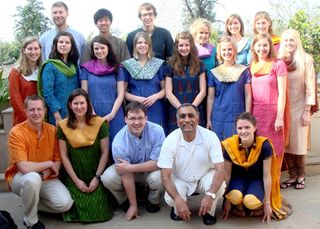I have just returned from India, along with a group of 17 students and some Covenant pastors. We, along with an organization called Truthseekers, went to India to serve the poorest of poor people in the slums of North India. I am very proud of our students. Most university students in the USA would rather go to places like the beaches of Florida. But these students decided to spend their spring break serving the low caste people of India, who have been enslaved by the high caste people of India for hundreds of years. It is estimated that these people comprise 80% of the population of India.
In New Delhi, we also visited the slum where I was born and reared. Unfortunately, the majority of the slum has been destroyed and the hundreds of people who lived in my slum have been evacuated to far flung areas outside Delhi, where they find themselves in deeper poverty, and prone to more enslavement.
This week was a life changing experience for my students. It seems to me that during spring break 2010, my students and I learned in a profound way the meaning of the incarnation of Christ, and of Lent. God became human⎯the Word became flesh, to “come down” to the slums of humanity, to live and die on the Cross.
In this series of blogs, we have been making a canonical journey through the Bible. In the light of the season of Lent, in the next few blogs, I want to fast-forward to the last days of the life of Jesus, and the concomitant canonical readings from the Hebrew Bible.
We begin with Matthew 16. Jesus asks his disciples, “Who do people say the Son of Man is?” Of course, people had all sorts of interpretations. Then Jesus asks them, “Who do you say that I am?” Peter, the ever-ready one, responds, “You are the Christ, the Son of the living God.” This is what I call a fulcrum text, a text around which the whole Gospel revolves. Once the disciples get this crucial lesson about the person of Jesus, the text says, “From that time Jesus began to show his disciples that he must go to Jerusalem and suffer many things from the elders and chief priests and scribes, and be killed, and on the third day be raised.” (Matthew 16:21). This is the main purpose of the Incarnation of God. This ought to be the central focus of an incarnational people of God. The Hebrew Bible’s portrayal of God is precisely this.
The Bible reveals to us the creator God, the Sovereign King of the universe. Yet we see this God reveal himself as the one who suffers with the poorest of poor, the lowliest of low people. We see this in Genesis 4, where God says to Cain, the murderer, “What have you done? The voice of your brother cries out (to me) from the ground.” (Genesis 4:10). The concomitant Torah reading from the life of Joseph shows the same theology of God.
Joseph is sold into slavery. He “goes down” into Egypt (Genesis 37:25 ff; Genesis 39:1). On many occasions he was saved from being hung on the “tree,” as was the lot of one of the people, whose dream Joseph had interpreted (Gen 40:19, 22). Egypt is called the land of “his suffering,” (Gen. 41:52). Towards the later part of the Joseph narrative, God says to Jacob, “I am the God, the God of your father. Do not be afraid to ‘go down’ to Egypt . . . I myself will ‘go down’ with you to Egypt” (Genesis 46:3, 4). The children of Israel suffer brutally under the hands of the cruel Pharaoh (Exodus 1). Yet God “goes down” and suffers with his people. He reveals himself to Moses, “I have surely seen the affliction of my people who are in Egypt and have heard their cry because of their taskmasters. I know their sufferings, and I have ‘come down’ to deliver them out of the hand of the Egyptians” (Exodus 3:8).
Throughout the Hebrew Bible, God is depicted as one who suffers for the weak and downtrodden. The final revelation of God is indeed seen in the last days of the life of Jesus the Messiah. God became incarnate, so that he might show the apex of suffering and die⎯indeed, die for the poorest of the poor.
It seems to me that just like Jesus, our students this week, in a very real way, experienced the suffering of the outcastes and the low castes in India. The sights, sounds, and images of suffering, I am certain are indelibly etched on their minds and hearts. In many senses, just like Jesus, our students learnt what it means to be an incarnational community during this season of Lent.
–Dr. Boaz Johnson, Professor of Biblical and Theological Studies and member of the Covenant World Relief Commission.
This blog originally appeared on the North Park University blog, “Working Class” and the original can be found here.





